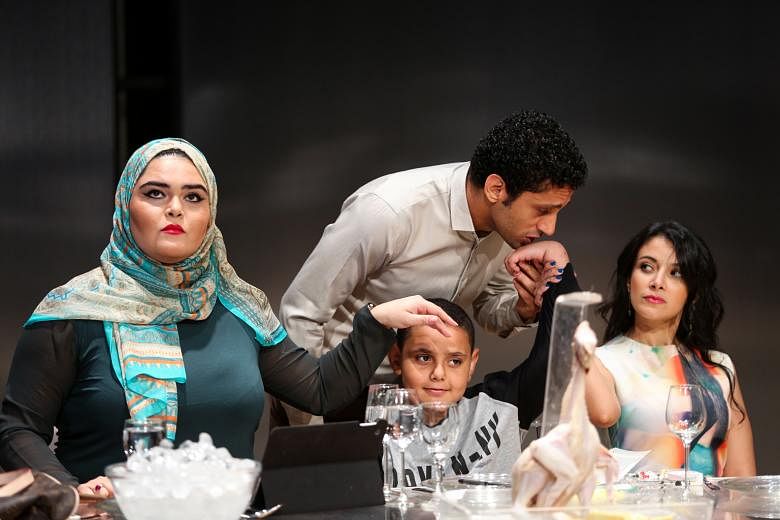REVIEW / THEATRE
THE LAST SUPPER
Ahmed El Attar
Victoria Theatre/Last Friday
The Last Supper, written and directed by Ahmed El Attar of Egypt, has a lot in common with the celebrated painting of the same name by Leonardo da Vinci of Italy.
The play, which ran during the opening of the Singapore International Festival of Arts last week, puts dinner guests on one side of a long, transparent table facing the audience, similar to the set-up of the painting.
Most of the action takes place on the sides of the table, just as in the painting. Guests gossip and jockey for power and the notice of the figures in the centre.
Da Vinci's painting has divinity - a calm Christ - at the centre, but in the play, the centre is occupied by the family patriarch (Boutros Boutros-Ghali the actor, not the former secretary-general of the United Nations) and his crony, the General (Sayed Ragab).
Both represent the increasingly heavy-handed and violent conditions in Egypt after the political revolution known as the Arab Spring.
Absent but continually called for is the matriarch Nadia, who nevertheless ensures that course after course is served at dinner. Her empty seat seems to represent the absence of compassion and humanity, a void unfilled as the family seated around it grows increasingly less humane in its treatment of the domestic help.
The Last Supper is literally a portrait of upper-class Egypt today, a tier of the social ladder that is freeze-framed despite the external chaos. Nothing much has changed for them because it does not need to.
For the wealthy, conditions on the street mean it is hard to park a luxury car, but they can escape to Paris, England or America at whim.
Pink-shirted Mido (Abdel Rahman Nasser) is milking the chaos for new business opportunities. The patriarch's son (Ramsi Lehner) uses his rank to bully a cowed maid (Mona Soliman) and smiling houseboy (Mahmoud El Haddad).
Thwarted by the butler (Mohamed Hatem), he teaches his son to torment the staff instead. The butler learns there is no reward for devoted service, the boy learns that his age will excuse viciousness.
His sister is ignored by her father and taught about make-up and pouting by her aunt Mayoush (Marwa Tharwat) and mother Fifi (Nanda Mohammad).
The Last Supper is at least three plays in one, a rich offering in a tight one hour.
There is the non-verbal, easily understood power-play between domestic help and employers. There are two verbal performances as men and women engage in separate dialogues. The surtitles fail to keep up, so several in-jokes and comments go over the audiences' heads.
What saves the play is that this could be any self-assured, selfish family in any country in the world, not just Egypt. Its members are outwardly devout, but consider their domestics "vermin" rather than human beings worthy of respect. Women receive only a bit more regard.
The men speak casually of rape in the hearing of their wives and a young daughter. When the women object, they are put in their place by the patriarch and the General.
There are absurdities galore to appreciate, including the presentation of skinned camel heads as food while the family poses for selfies. The dish and server are bathed in blood- red light, indicating the external turmoil, while the family freezes inanely in its bubble of comfort.
The crowning touch is Mido offering his nephew a tortoise for a pet because none of the dogs he saw were of sufficiently good breeding.
The tortoise scurries away as the play ends and the performers freeze, indicating yet again the restlessness and helplessness of the "vermin" classes below the notice of the top tiers of society.


